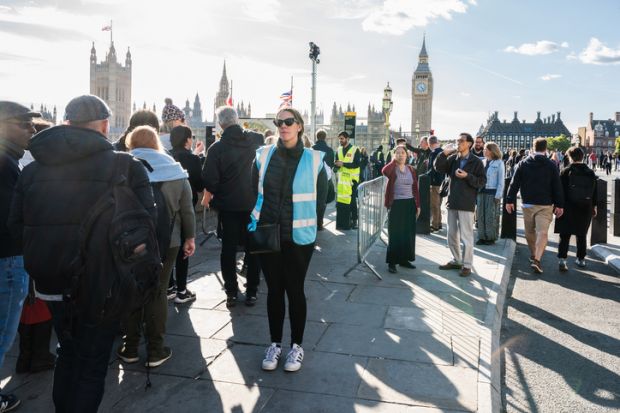Russell Group universities have massively expanded recruitment onto politics and international relations courses over the past decade, while programmes run by institutions outside the elite grouping have, in contrast, seen declining enrolments, a new study has shown.
In its latest analysis of the state of politics studies in the UK, the British Academy finds that the number of students studying this subject as a first degree increased by 20 per cent between 2011-12 and 2022-23, while there was a 41 per cent rise in taught postgraduate enrolments in this period.
However, the report notes that this was mainly as a result of rising student numbers overall, and the proportion of students taking politics and international relations has decreased slightly in the 2020s.
It also masks a “stark contrast” between the growth of Russell Group institutions, and that of pre- and post-92 providers.
Between 2012-13 to 2021-22, numbers of first-degree students at Russell Group institutions increased by 320 on average, while for the other two groups recruitment declined on average; by 24.7 and 16.8 respectively.
“The growth in student numbers for politics and international relations at the undergraduate and postgraduate taught levels has been highly uneven across institutions. In some cases, this has led to cutbacks and even the closure of departments. There is a stark difference between Russell Group members and the rest of the sector for undergraduate programmes,” the report says.
Even within the Russell Group, the report identifies significant variation between institutions, with one provider seeing its student intake rise by 957 and others experiencing less dramatic growth.
The report adds: “This suggests that while there is a clear divergence between the Russell Group institutions and the rest of the sector (in average change in student numbers), patterns of student recruitment have not been uniform across Russell Group institutions. Some have increased moderately while others have increased massively.”
In recent years Russell Group universities have been accused of “hoovering up” students, particularly on humanities courses that are generally cheaper to run. Last year, heavy domestic recruitment among the research-intensive grouping in the face of international enrolment challenges prompted calls for a return to student number controls.
Those interviewed for the report who had seen a decline in recruitment said this was linked to the current context of wider financial challenges facing institutions. According to the report, “there was also a sense that, in the years ahead, departments would be faced with institution-wide cutbacks”.
More positively, none of the participants interviewed described the current position as an “existential threat” to their department at present.
The picture was more mixed at postgraduate level, the report outlines, adding that reductions were “much less severe than for undergraduate provision”. Russell Groups saw their mean change stand at 90.3, followed by 11.5 at other pre-92s, and 20.6 at post-92s.
Peter John, professor of public policy at King’s College London and a member of the report’s advisory group, said: “Interest in politics and international relations has clearly broadened over the past decade, perhaps as a response to today’s increasingly divisive and uncertain political climate. The increase in research funding and the growing diversity of voices in these fields indicate a strong demand for the essential role that this research plays in shaping an informed and resilient future.”
Register to continue
Why register?
- Registration is free and only takes a moment
- Once registered, you can read 3 articles a month
- Sign up for our newsletter
Subscribe
Or subscribe for unlimited access to:
- Unlimited access to news, views, insights & reviews
- Digital editions
- Digital access to THE’s university and college rankings analysis
Already registered or a current subscriber?









